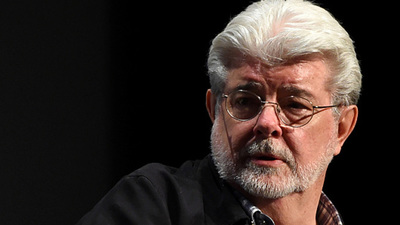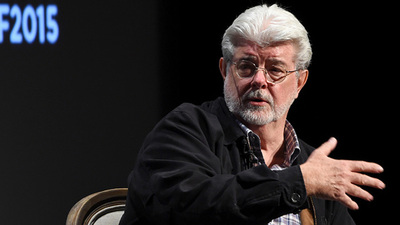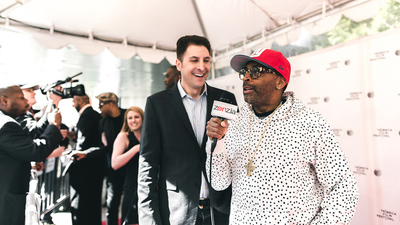
BY MATT BARONE |
George Lucas Brought "The Force" To Stephen Colbert & TFF 2015 For A Candid Tribeca Talks Event
The STAR WARS creator joined forces with the former COLBERT REPORT host for a candid hour-long discussion about all things Lucas.
As if Star Wars fanatics didn’t already have enough to celebrate this week, right?
Twenty-four hours after the trailer for J.J. Abrams’ Star Wars: The Force Awakens debuted online and damn near broke Twitter, the 2015 Tribeca Film Festival gave New York City’s biggest fans of the franchise the best possible post-trailer gift: the mastermind himself, George Lucas, in person inside the Borough of Manhattan Community College (BMCC). Making the sweetness even sweeter, Lucas was interviewed on stage as part of this year’s Tribeca Talks® series by Stephen Colbert, the brilliant comedian/satirist behind Comedy Central’s now-defunct The Colbert Report and David Letterman’s upcoming Late Show replacement. And over the course of one laid-back, informative, and often-hilarious hour, the two titans of their respective fields didn’t disappoint.
VIDEO: WATCH LUCAS DISCUSS THE FORCE AWAKENS ABOVE

photos by @JoeCav_
It didn’t hurt that, like everyone else in the room, Colbert’s been a Star Wars nerd since he first saw the 1977 original on a Saturday with his best friend after winning a contest hosted by Charleston, South Carolina, radio station WTMA. That following Monday back at school, teenage Colbert and his pal struggled to relay the experience to his classmates. “We couldn’t explain to anyone how the world was different now.” Colbert’s didn’t hold back his unabashed geekiness in front of Lucas, either. He opened the discussion with the question, “I’m gonna tear you a new one, George—how dare you entertain me consistently since I was a 13-year-old?” A few questions later, Lucas interrupted his own statement by letting out a huge sneeze that, being emitted into his mic, felt like a mini earthquake inside the BMCC, and Colbert jumped on the moment: “I’ll never get to say this to you again: may the force be with you.”
The rest of the evening had a similar anything-goes tenor, with Lucas recounting his dreams of becoming a race car driver, which have trickled into his all of his movies in one way or another (Star Wars, for example, featured “hot rods that flew in space.”); his days making weird experimental projects at USC’s film school; and his hugely influential friendship with Francis Ford Coppola back in his mid-20s, among other topics. The theme of the event, heard in all of Lucas’ responses, was evident: in order to do everything that George Lucas has done in his career, one must follow George Lucas’ lead and not give a you-know-what about what others think of them and their work.
The Hollywood icon’s untouchable confidence, which Stephen Colbert and everyone in attendance witnessed firsthand yesterday, really shined through in these five distinct moments:
The Sound of Words
Early into the talk, Colbert asked Lucas to explain precisely how he changed the landscape of science fiction cinema with 1977’s Star Wars. Having been hugely inspired by Stanley Kubrick’s 2001: A Space Odyssey Lucas first had to develop his own new technology to execute the quick cuts and “kinetic energy” he wanted for the film.
That recollection led into Lucas himself bringing up one particularly common critical attack against his movies: their “wooden dialogue.” And, wouldn’t you know it, Lucas doesn’t care about those insults. “I believe half of a movie is the sound,” he told Colbert, explaining that, in his mind, what a film’s characters say to one another are merely part of the overall soundtrack and sound design. “The sound is what’s important—the dialogue is not.” So the next time you’re about to make fun of Jar Jar Binks, just remember that Lucas couldn’t care less about your jokes.
Sticking It To Hollywood
While chatting about his enormously successful 1973 coming-of-age comedy American Graffiti, Lucas revealed to Colbert that studio execs and other Hollywood big-wigs didn’t want to release the film at first, because they flat-out didn’t like it. Which, naturally, blew Colbert’s mind, prompting Lucas to elaborate.
He lumped all of Hollywood’s corporate types into what he calls the “Creative Industrial Complex,” a machine that’s only concerned with the “industrial” part and scoffs at the “creative” part. And Lucas has only ever had one response to those folks: “Look, guys, get a brain! Don’t think you can do this!”; meaning, of course, that the industrially minded types don’t know how to actually make movies, so why should artists and filmmakers have to listen to them?
Because he’s one of the funniest people alive, Colbert mocked the Creative Industrial Complex hive mind—more specifically, he imagined what they might’ve said about Star Wars: “Why does that kid move stuff with his mind? Why doesn’t he just grab it?... “I don’t get it—why does the tall black man have asthma?”
If You Don’t Have Anything Nice To Say…
After about an hour’s worth of Colbert’s one-on-one time with Lucas, Colbert opened the talk up to questions from the audience. The first one came from a young woman who asked Lucas to recall the best piece of constructive criticism he’s ever received. He briefly stated that the only constructive criticism he values comes from his fellow director friends like Steven Spielberg, Francis Ford Coppola, Brian De Palma, and Martin Scorsese, but he then threw some shots at film critics who aren’t opposed to vehemently ripping movies apart. “Art is in the eye of the beholder,” said Lucas, “so if you don’t like something, why go around trashing it? You should just ignore bad films.”
Back To Basics
Another great question came one from a different audience member, who asked Lucas if he’s interested in going back to smaller, weird experimental movies like his 1971 debut, THX 1138, now that he’s sold the Star Wars franchise away to Disney. “That is exactly what I’m doing,” he quickly responded, triggering a round of applause from the crowd.
In Lucas’ opinion, there are two types of experimental filmmakers. The first are those whose humble bank accounts require them to scrape every dollar they can together and lay it all on the line in the name of their left-of-center art. Lucas, obviously, doesn’t fall in that category. “The other way to do it is become very rich, take the money I would otherwise use to build a yacht, put it in a vault,” and use those mountains of cash to fund his own experimental cinema.
Words Of Blunt Wisdom
The final audience question was, to the credit of the guy who asked it, both ambitious and ballsy. Giving his age, 21, the guy explained to Lucas that when he was ten, his grandfather gave him a notebook to use as an idea journal, and he’s been filling its pages with story concepts ever since, which prefaced his actual question: would George Lucas ever need his help—to, you know, come up with new ideas? Lucas, though, kept it all the way real: “That is what the studios are for. They’re the suckers. I’m retired.” Colbert chimed in with, “I can translate that: go to Hollywood and suffer.”
Then, minutes later, whether by accident or a stroke of event-planning genius, Kanye West’s song “Can’t Tell Me Nothing” played over the BMCC speakers as the crowd exited the building. (Yeah, let’s just imagine that Lucas personally requested that record as his departing theme.)
Reading about Stephen Colbert’s excellent George Lucas interview isn’t enough? See how it all went down with our exclusive video clips.
Tribeca Film Festival videos are shot on equipment provided by Adorama Rental Co.

